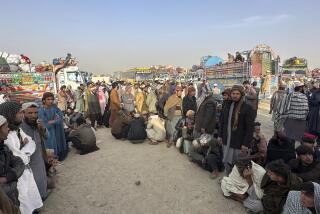Musharraf Seeks Quick Plan for Afghans
- Share via
NEW YORK — Pakistani President Pervez Musharraf warned Sunday that Afghanistan faces imminent “anarchy” if squabbling ethnic and tribal factions don’t move quickly to form an alternative government now that the opposition Northern Alliance is forcing the ruling Taliban into retreat.
“The worst-case scenario is if you achieve military objectives like just now and there’s no political arrangement or no rehabilitation strategy on the ground,” he said in an interview with The Times. “There will be a vacuum--and there will be anarchy returning to Afghanistan.”
Too much military progress by the Northern Alliance’s ethnic minorities could end up alienating the country’s dominant Pushtun population, said Musharraf, who faulted all sides of the deeply fragmented country.
“Over-strengthening” the Northern Alliance, which has taken strategic Mazar-i-Sharif and other northern towns in the past three days, also risks slowing the political strategy and potentially forcing the Pushtun to side with the Taliban, he said. The Taliban is overwhelmingly Pushtun, and winning the support of key tribal leaders and commanders is considered crucial to ousting the rigid Islamic regime.
“If all the effort is concentrated behind the Northern Alliance, and its army seems to be succeeding everywhere, that will strengthen [Pushtun] unity,” he said. “That will be very dangerous.”
On the eve of an emergency U.N. meeting of Afghanistan’s neighbors plus the United States and Russia, Musharraf said the United Nations needs to play a more active role in helping to cobble together a broad-based coalition government. But the general, who came to power in a 1999 military coup, cautioned against trying to impose any formula on the Afghans.
“The Afghans have to crystallize a strategy for themselves, and we can only facilitate [the transition],” he said.
One option is for various Afghan figures to streamline their efforts to forge a new government. The Northern Alliance and former Afghan monarch Mohammad Zaher Shah are trying to form an interim governing council, but Pushtun resistance leader Pir Sayed Ahmad Gailani convened 800 Afghan leaders last month in a separate bid to create a political order to replace the Taliban.
After a new government is deployed in liberated areas of Afghanistan, the goal would be for the Afghans themselves to topple the Taliban, Musharraf’s aides said.
Musharraf, who Saturday met with President Bush and spoke to the United Nations about the crisis, has been discussing political strategy with various key players behind the scenes here.
He expressed confidence that the U.S.-led campaign against terrorist targets in Afghanistan would not take years, as the British defense secretary predicted recently. “The war has turned the corner,” he declared. “I can’t imagine any operation to be going on in Afghanistan that would last for years.”
The Taliban has been crippled by the loss of its communications network, which has cut off Afghanistan’s military commanders from many of their troops. “Any organization, to have military strength, must have homogeneity, communications and infrastructure,” he said. “And I can’t imagine that the Taliban operation is being conducted in a very homogenous or integrated manner.”
Only personal allegiances to local commanders are holding units together, he added.
There is also an urgent need to keep the campaign short since a prolonged military operation would have a “negative fallout all over the world” and encourage the growth of Islamic extremism throughout the more than 50 nations in the Islamic bloc, including Pakistan, he warned.
The failure to make progress in tracking Osama bin Laden, he said, was due to the fact that intelligence has dried up, especially since the airstrikes began. “I wish I knew where he was,” Musharraf said.
Various high-tech sources of intelligence, such as spy satellites, can track human movement--but not differentiate among the humans. The coalition is now scrambling to rebuild a human intelligence network, which he described as the key to isolating and capturing Bin Laden, the chief of the Al Qaeda terrorist network.
Musharraf said he doubts that Bin Laden has either nuclear or chemical weapons, as recently reported. A nuclear weapon “is not like a football that you can just possess and fire it off. It needs a core. It needs the trigger mechanism. It needs the delivery mechanism. It’s a very high-tech job. I don’t think he can even possess it or ever actuate such a device,” he said.
Chemical weapons are more easily produced, but Musharraf said he has no “definite knowledge” that they are part of Bin Laden’s arsenal. He also rebutted news reports that the Taliban has two chemical weapons plants. He said he does not believe the former religious students, who fought their way to power in 1996, have “any such capacity.”
Musharraf also vehemently denied that he has relocated any of Pakistan’s nuclear weapons components, which he said have long been in “very secure places.”
News reports Sunday said Pakistan had moved parts of its nuclear arsenal after the Sept. 11 crisis to prevent them from attack or theft.
“Why would we place them in insecure places that would require them to be moved? They are in very secure hands. And there’s no question of them falling into the hands of any irresponsible person. I have made sure that is our guarantee to the world. There was no movement whatsoever,” Musharraf added.
More to Read
Sign up for Essential California
The most important California stories and recommendations in your inbox every morning.
You may occasionally receive promotional content from the Los Angeles Times.













